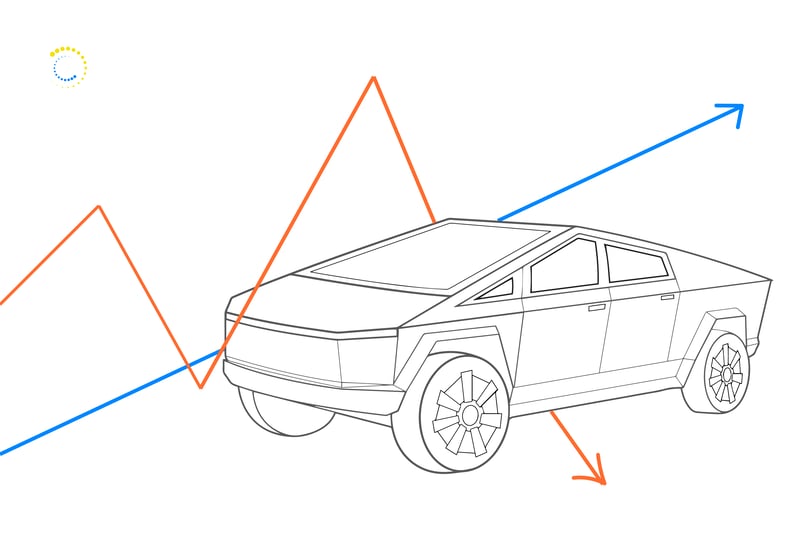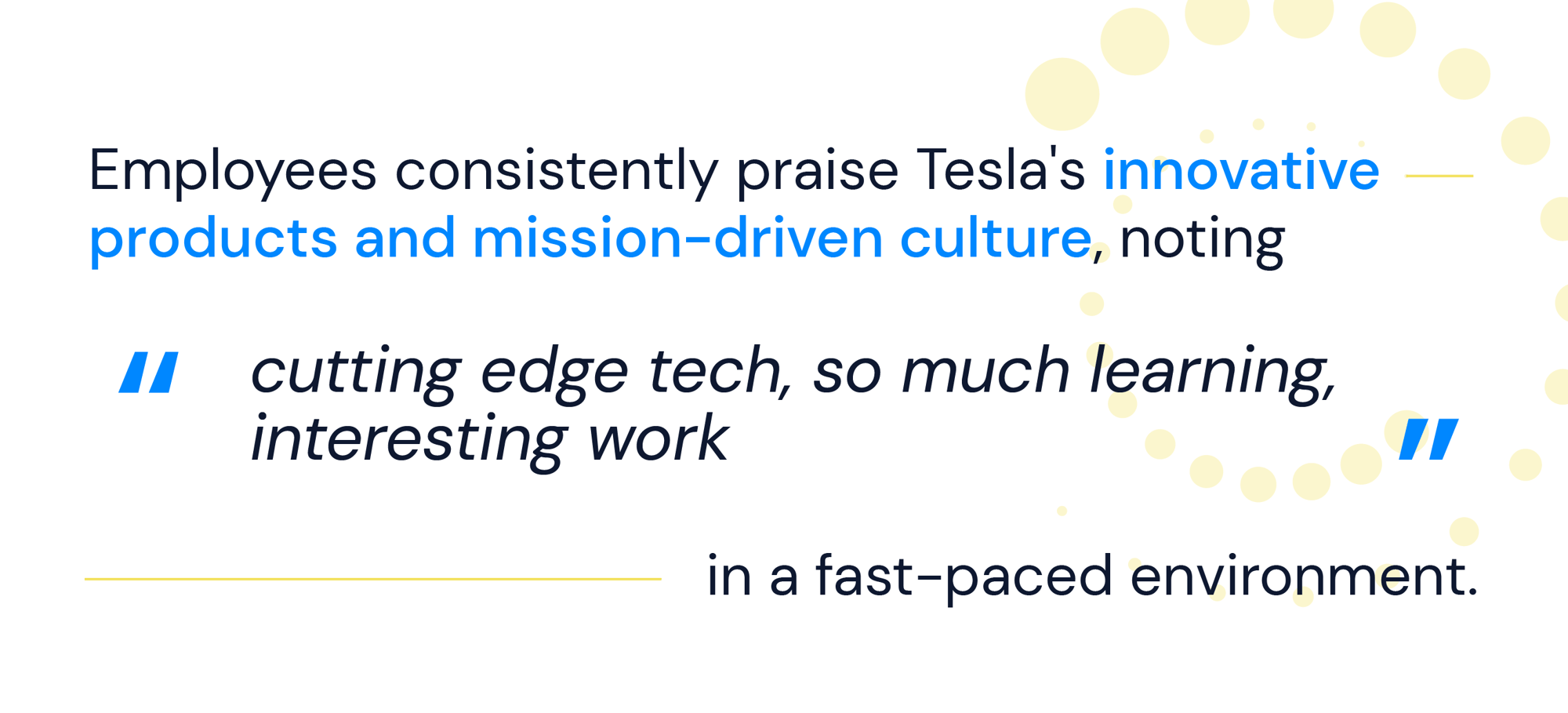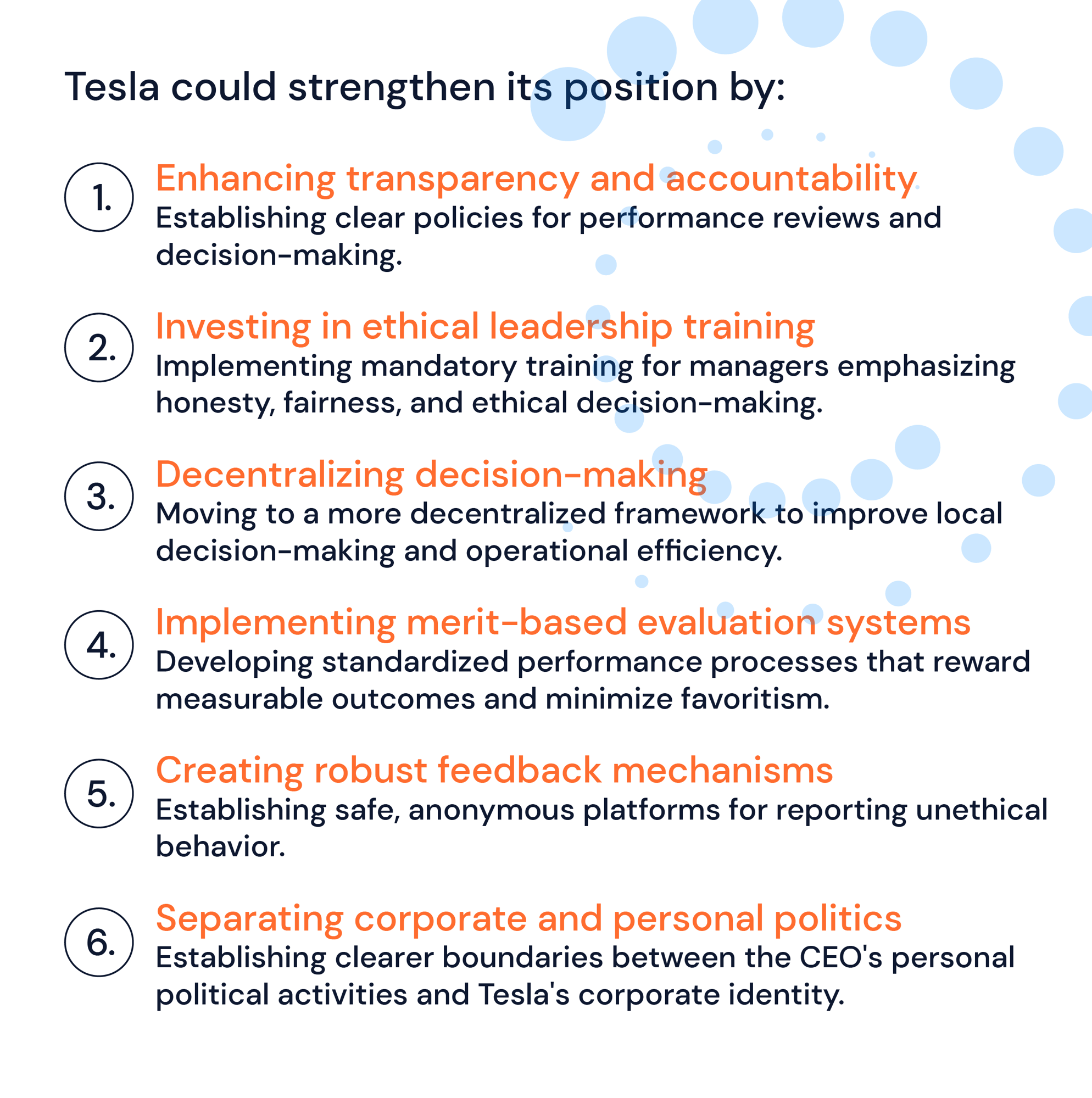
The Elon Paradox: How Tesla's Leadership Style Fuels Innovation Yet Undermines Trust and Stability
Tesla stands at the forefront of the electric vehicle revolution, celebrated for groundbreaking technology while scrutinized for its workplace culture. Aniline’s AI analysis, grounded in employee perception data, reveals a paradox: the leadership approach driving Tesla's innovation may simultaneously undermine its integrity, stability, and performance. This dilemma has gained urgency as Tesla's stock has experienced its longest losing streak ever, falling for eight consecutive weeks and halving since its December peak.
The Leadership and Integrity Dilemma
Tesla operates with a highly centralized, top-down decision-making model. Leadership is described as "erratic," with frequent priority shifts creating organizational instability and confusion about long-term objectives. Employees report a concerning lack of accountability and transparency, noting that "managers and HR are literally the CEO," highlighting executive overreach and pervasive micromanagement.
Integrity issues compound these challenges. Employee feedback indicates Tesla's integrity is compromised by inconsistent, unfair, and sometimes deceptive practices. Reports include management "constantly lying" and violating company policy, with staff being treated "like garbage" when not useful. Multiple employees state that "integrity and character are not rewarded."
While 65% of Tesla's managers were promoted internally, frequent leadership turnover creates discontinuity. Feedback suggests "upper management only cares about numbers," prioritizing quantitative metrics over qualitative insights and employee expertise.
CEO Elon Musk's increasing political involvement has created additional challenges. His public endorsements and controversial statements have led to concerns about the Tesla brand becoming "increasingly politicized." Internally, this has reportedly intensified workplace tensions, with some employees feeling alienated by their CEO's stances.
The Innovation Engine
Despite these challenges, Tesla's rise as a technological pioneer stems from a leadership model emphasizing rapid iteration, bold decision-making, and relentless pursuit of technological advancement.
Employees consistently praise Tesla's innovative products and mission-driven culture, noting "cutting edge tech, so much learning, interesting work" in a fast-paced environment. Tesla's product pipeline and technology have cemented its market leadership, with advanced automation and R&D capabilities resonating with sustainability-focused audiences.
This innovation-focused approach attracts world-class talent, particularly in engineering and R&D, where cross-functional collaboration drives product excellence. Tesla became the fastest-growing brand in markets like South Korea, with Model Y becoming the best-selling vehicle in
China for 2023. Total revenue reached $96.77 billion in 2023, an increase of $15.31 billion from the previous year.
Tesla's competitive compensation includes strong base pay, stock options (available to 89% of employees), and comprehensive day-one benefits, helping maintain a meritocratic environment that fuels creativity and rapid learning.

The Culture Consequence
Leadership and integrity challenges reverberate throughout Tesla's culture. The innovative but high-pressure work environment creates significant burnout and stress, leading to heightened turnover and productivity disruptions.
While Tesla achieved record deliveries and energy storage deployments in Q4 2023, employees faced relentless schedules and work-life imbalance—factors jeopardizing long-term retention. When employees fear arbitrary layoffs or favor-driven decisions, energy shifts to self-preservation rather than innovation. Employees report "no safety" and a "modern day slavery feel" when policies change arbitrarily.
Safety and compliance concerns emerge from inconsistent enforcement of protocols and reactive regulatory management. Despite daily safety huddles demonstrating some structure, fragmented communication and uneven policy enforcement create significant compliance gaps.
Musk's political activities have further complicated Tesla's cultural environment, creating what some describe as an increasingly politicized workplace where political viewpoints can impact career advancement. Some employees perceive that leadership's commitment to diversity and inclusion has wavered, eroding trust in the organization's ethical framework.
Assessment reveals that despite strong technical training, frequent layoffs and turnover—especially in HR and specialized functions—undermine employee loyalty and long-term satisfaction.

The Market Implications
This leadership, integrity, and cultural dynamic creates tension for Tesla's market position. Tesla's production and delivery numbers remain impressive—1,845,985 vehicles produced and 1,808,581 delivered in 2023. Energy storage deployments grew by 114% year-over-year to 31.4 GWh.
However, internal challenges threaten this momentum as external competition intensifies. Chinese EV makers are advancing rapidly, with BYD unveiling five-minute charging technology, Li Auto releasing new autonomous-driving models, and XPeng posting smaller-than-expected losses. Tesla's market share is reportedly falling in key markets like Europe and China.
Customer relationships face challenges in post-sale support. While Tesla excels at sparking enthusiasm through innovation, fragmented support and disjointed internal communication undermine long-term customer satisfaction.
Musk's political positioning has added another dimension of market risk, with shifting consumer sentiment along political lines potentially limiting Tesla's market in certain demographics. The company's government relations have become more complex as Musk publicly criticizes various political figures and policies.
Resolving the Paradox

The Path Forward
With $29.09 billion in cash and $13.26 billion in operating cash flow in 2023, Tesla has the financial resources to invest in leadership transformation and integrity improvements.
The company's visionary products and strong market position provide a foundation for future growth. However, addressing integrity, cultural, and management challenges is essential for long-term competitive advantage.
The entanglement of Tesla's brand with Musk's political identity presents both challenges and opportunities. The key will be finding a balance that maintains broad appeal while respecting Musk's right to political expression.
If Tesla can resolve this leadership paradox—maintaining innovation while developing more structured, ethical management practices—it can transform from a disruptive startup into an enduring industry leader delivering consistent value for decades to come.
The coming years will determine whether Tesla's leadership can evolve to match the sophistication of its technology—potentially as revolutionary for corporate management as Tesla's vehicles have been for transportation.
.png?width=4334&height=1355&name=Logo%20with%20name_Blue+Yellow%20(1).png)